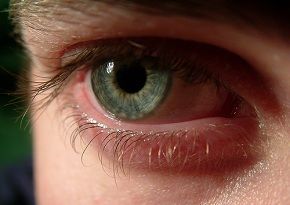Enzyme inhibition or removal may prevent or treat ischemic retinopathy

The inhibition or removal of an enzyme may prevent or treat ischemic retinopathy by stalling growth of unwanted vessels in the retina, Medical College of Georgia researchers say.
Ischemic retinopathy is characterized by uncontrolled formation of new blood vessels in the retina, and is seen in diseases such as diabetic retinopathy and retinopathy of prematurity. While this blood vessel formation, called neovascularization, can benefit ischemic heart disease and wound healing, it is bad in the retina, where new vessels are dysfunctional and bleed, usually ending in retinal detachment.
Retinal neovascularization is controlled by a balancing act between pigment epithelium derived factor, the "good guy," and its nemesis, vascular endothelial growth factor.
"We wanted to learn how the disruption of that balance occurs and how to prevent it," said Dr. Mohamed Al-Shabrawey, Assistant Professor of Oral Biology, Anatomy and Ophthalmology and corresponding author of the study published online in Diabetes.
Al-Shabrawey studied an inflammatory pathway that has been shown to induce expression of the bad growth factor. In that pathway, the enzyme 12-lipoxygenase converts arachidonic acid, which helps regulate neovascularization, into the product 12-hydroxyeicosatetraenoic acid, or 12-HETE. He hypothesized that 12-HETE is linked to retinal neovascularization.
The study found a significant increase in the expression of the enzyme and production of 12-HETE in humans with advanced-stage diabetic retinopathy and in animals with induced ischemic retinopathy.
Al-Shabrawey also treated retinal Müller cells in vitro with 12-HETE. He found this increased the amount of vascular endothelial growth factor and decreased pigment epithelium derived factor, disrupting the balance and leading to neovascularization.
Using this finding, Al-Shabrawey's team found that treating the animals with an enzyme inhibitor or inducing ischemic retinopathy in animals lacking the enzyme restored that balance and inhibited neovascularization.
"This led us to conclude that if we can target or inhibit this enzyme's pathway, we might be able to prevent or treat diseases of ischemic retinopathy," Al-Shabrawey said.
While this study focused on an end stage of the disease, the next step is to study how inhibiting the enzyme will affect earlier stages of vascular dysfunction.



























